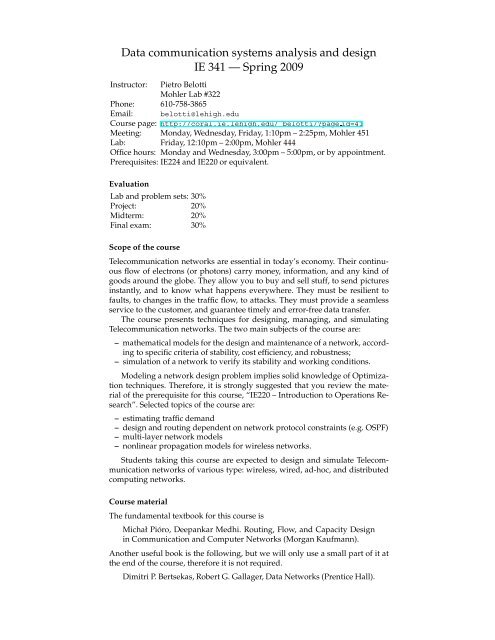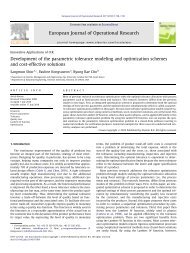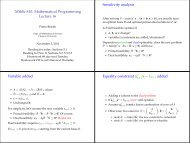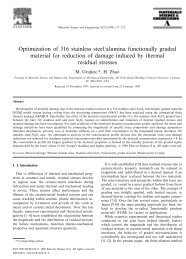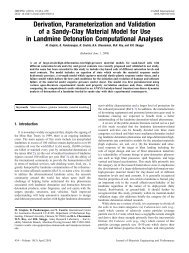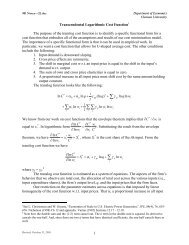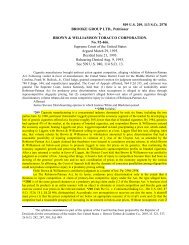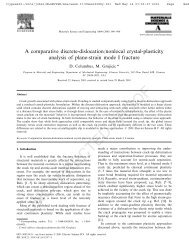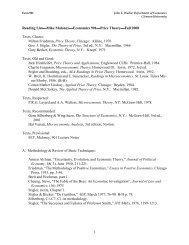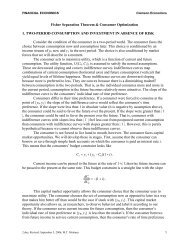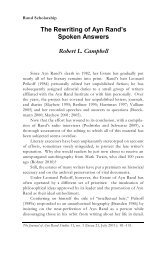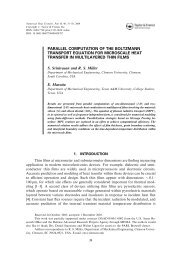Data communication systems analysis and design IE 341 - Clemson ...
Data communication systems analysis and design IE 341 - Clemson ...
Data communication systems analysis and design IE 341 - Clemson ...
Create successful ePaper yourself
Turn your PDF publications into a flip-book with our unique Google optimized e-Paper software.
<strong>Data</strong> <strong>communication</strong> <strong>systems</strong> <strong>analysis</strong> <strong>and</strong> <strong>design</strong><br />
<strong>IE</strong> <strong>341</strong> — Spring 2009<br />
Instructor: Pietro Belotti<br />
Mohler Lab #322<br />
Phone: 610-758-3865<br />
Email: belotti@lehigh.edu<br />
Course page: http://coral.ie.lehigh.edu/˜belotti/?page id=41<br />
Meeting: Monday, Wednesday, Friday, 1:10pm – 2:25pm, Mohler 451<br />
Lab: Friday, 12:10pm – 2:00pm, Mohler 444<br />
Office hours: Monday <strong>and</strong> Wednesday, 3:00pm – 5:00pm, or by appointment.<br />
Prerequisites: <strong>IE</strong>224 <strong>and</strong> <strong>IE</strong>220 or equivalent.<br />
Evaluation<br />
Lab <strong>and</strong> problem sets: 30%<br />
Project: 20%<br />
Midterm: 20%<br />
Final exam: 30%<br />
Scope of the course<br />
Tele<strong>communication</strong> networks are essential in today’s economy. Their continuous<br />
flow of electrons (or photons) carry money, information, <strong>and</strong> any kind of<br />
goods around the globe. They allow you to buy <strong>and</strong> sell stuff, to send pictures<br />
instantly, <strong>and</strong> to know what happens everywhere. They must be resilient to<br />
faults, to changes in the traffic flow, to attacks. They must provide a seamless<br />
service to the customer, <strong>and</strong> guarantee timely <strong>and</strong> error-free data transfer.<br />
The course presents techniques for <strong>design</strong>ing, managing, <strong>and</strong> simulating<br />
Tele<strong>communication</strong> networks. The two main subjects of the course are:<br />
– mathematical models for the <strong>design</strong> <strong>and</strong> maintenance of a network, according<br />
to specific criteria of stability, cost efficiency, <strong>and</strong> robustness;<br />
– simulation of a network to verify its stability <strong>and</strong> working conditions.<br />
Modeling a network <strong>design</strong> problem implies solid knowledge of Optimization<br />
techniques. Therefore, it is strongly suggested that you review the material<br />
of the prerequisite for this course, “<strong>IE</strong>220 – Introduction to Operations Research”.<br />
Selected topics of the course are:<br />
– estimating traffic dem<strong>and</strong><br />
– <strong>design</strong> <strong>and</strong> routing dependent on network protocol constraints (e.g. OSPF)<br />
– multi-layer network models<br />
– nonlinear propagation models for wireless networks.<br />
Students taking this course are expected to <strong>design</strong> <strong>and</strong> simulate Tele<strong>communication</strong><br />
networks of various type: wireless, wired, ad-hoc, <strong>and</strong> distributed<br />
computing networks.<br />
Course material<br />
The fundamental textbook for this course is<br />
Michał Pióro, Deepankar Medhi. Routing, Flow, <strong>and</strong> Capacity Design<br />
in Communication <strong>and</strong> Computer Networks (Morgan Kaufmann).<br />
Another useful book is the following, but we will only use a small part of it at<br />
the end of the course, therefore it is not required.<br />
Dimitri P. Bertsekas, Robert G. Gallager, <strong>Data</strong> Networks (Prentice Hall).
Laboratory<br />
The laboratory for this course will consist in modeling, <strong>design</strong>ing, analyzing<br />
<strong>and</strong> simulating network from real-world applications. The tools for these tasks<br />
will be modeling tools such as AMPL <strong>and</strong> network simulation tools.<br />
Project<br />
An essential part of this course is a h<strong>and</strong>s-on experience on real Optimization<br />
problems. As for the homeworks, it must be completed to receive a grade.<br />
Every student is assigned a specific Network model <strong>and</strong> he/she must solve the<br />
modeling/<strong>design</strong>ing problem using the tools learned during the course. The<br />
result of the project is a short report <strong>and</strong> a network model whose evaluation<br />
accounts for 25% of the final grade.<br />
Tentative calendar<br />
Week Block Topic Reading Laboratory<br />
1 Models Introduction Chapter 1 AMPL, Neos, Kestrel<br />
2 Design, routing Chapters 2,3 Routing, congestion<br />
3 Routing models Chapters 4,6 OSPF routing<br />
4 Wireless Propagation H<strong>and</strong>outs Wireless models<br />
5 Overlapping H<strong>and</strong>outs Design, overlapping<br />
6 Frequency assignment Articles Freq. assignment<br />
7 Robustness Dem<strong>and</strong> estimation H<strong>and</strong>outs Robust <strong>design</strong><br />
8 Robust models H<strong>and</strong>outs Robust routing<br />
9 Protection 1:1 protection Chapter 9 Protection<br />
10 Restoration Chapter 10 Shared protection<br />
11 Multi-layer Optical networks Chapter 12 Wavelength assignment<br />
12 Two-layer models Chapter 13 Two-layer models<br />
13 Simulation Node simulation H<strong>and</strong>outs Simulation software<br />
14 Network simulation H<strong>and</strong>outs Network simulation<br />
Problem sets<br />
There is one lab <strong>and</strong> a problem set each week, <strong>and</strong> all must be completed to receive<br />
a grade for the course. These require solving simple network <strong>design</strong> <strong>and</strong><br />
<strong>analysis</strong> problems. The problems are stated in informal language, <strong>and</strong> your task<br />
is to solve them, <strong>and</strong> do some extra work such as experimenting with sample<br />
or r<strong>and</strong>om data. Note: homeworks will be penalized of 50% for each day they<br />
are late. After two days, they will not be accepted. No exception.<br />
Online resources<br />
Announcements <strong>and</strong> messages will be posted on the course website. Lecture<br />
notes, course information, homeworks, solutions, <strong>and</strong> other material will also<br />
be posted on the course webpage, while grades will be posted on Blackboard.<br />
Policy<br />
You are expected to come to class regularly <strong>and</strong> to be prepared for each class by<br />
reading the relevant sections of the textbook ahead of time. I will post slides in<br />
advance so that you may bring them to class if you wish. You are also expected<br />
to participate in class discussions <strong>and</strong> ask questions when you are confused.
Plagiarism: I encourage you to consult with your colleagues when you’re working<br />
on homework. However, you will not underst<strong>and</strong> the material or do well<br />
on the exams unless the work that you turn in is ultimately your own. Therefore,<br />
you must write up your answers alone, <strong>and</strong> without looking at anything<br />
you wrote down while working with your group. This means that if you solved<br />
the problem with a friend, you’re going to have to go home <strong>and</strong> solve it all over<br />
again, by yourself. The work you turn in must be your own.<br />
You must cite everyone with whom you worked or consulted about each<br />
problem, as well as any material (books <strong>and</strong> online resources other than the<br />
course books <strong>and</strong> lecture notes) that you used to solve the problem. Any breach<br />
of this policy will be considered an act of plagiarism, <strong>and</strong> no credit will be given<br />
for such assignments. Repeat offenses will be grounds for failure for the course.<br />
Extended Absences: If you believe you will miss two or more consecutive lectures<br />
due to illness, family emergencies, etc., please contact me as early as possible<br />
so that we can develop a plan for you to make up the missed material. Under<br />
no circumstances will I give credit for missed homework or exams unless you<br />
have discussed your absence with me in advance.<br />
See also http://www.lehigh.edu/˜inprv/academicintegrity.html.<br />
Accommodations for Students with Disabilities<br />
If you have a disability for which you are or may be requesting accommodations,<br />
please contact both your instructor <strong>and</strong> the Office of Academic Support<br />
Services, University Center C212 (610-758-4152) as early as possible in the<br />
semester. You must have documentation from the Academic Support Services<br />
office before accommodations can be granted. For more information, please<br />
visit the student support services website:<br />
http://www.lehigh.edu/˜inacsup/disabilities.<br />
Note: this document is subject to change.


